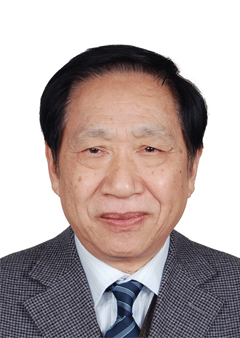Mr. YE Qizhen

Mr. YE Qizhen, born in Wuhan, Hubei Province on 16 September, 1934, is a distinguished expert in energy science and technology. He graduated from Department of Electrical Engineering in Shanghai Jiao Tong University in 1955 and gained his deputy doctor’s degree from Moscow College of Power in the former Soviet Union in 1960. He is currently deputy director of Science and Technology Committee of China National Nuclear Corporation (CNNC) and director of expert committee of China Nuclear Power Engineering Co.,Ltd. He also serves as a member of expert consultation committee and nuclear safety committee of State Administration of Science Technology and Industry for National Defense, and a member of expert consultation committee of National Energy Administration.
Mr. Ye participated in the design of the first production reactor of China in the 1960s and design of dual-purpose (production plus electricity generation) reactors as the chief engineer in the 1970s. As the chief engineer, he had devoted himself to construction of another new 600 MW NPP in the site of Qinshan Nuclear Power Plant since 1986 and witnessed its successful commercial operation in 2002.
Mr. Ye was elected as an academician of the Chinese Academy of Engineering in 2003.
Abstract for keynote :It is now widely recognized that inevitable increase in energy demand and climate change have become and will remain the most important twin problems facing humankind over the medium to long term. As a sustainable, reliable, low-carbon, and efficient energy source, nuclear power contributes over 11% of the global electricity while emits extremely low levels of greenhouse gases (GHG). It is becoming an international consensus that nuclear energy will continue to play a major role in lowering emissions from the power sector, while improving security of energy supply and providing large-scale electricity at stable production costs.
With support of Sino-France Cooperation Program on Nuclear Energy in 2017(Program Phase-I), experts from the Chinese Academy of Engineering, the National Academy of Technologies of France and the French Academy of Sciences jointly drafted a splendid report titled Joint Proposals On Future Of Nuclear Energy which received warm response after its release in the 2017 IAEA General Assembly in Vienna. In 2018, our three academies continued our cooperation to implement Program Phase-II and chose “nuclear energy and the environment” as the topic of our joint research. The present report to be released in this Summit is the result of our collaborative research on the topic.
The report more specifically deals with the impact of nuclear energy on the environment considering all operations from uranium mining to radioactive waste disposal. It addresses in particular the four major environmental issues associated with nuclear power generation:
l Evaluation and control of the radioactivity released by nuclear installations under normal operation,
l Management of spent fuels and radioactive wastes, notably those that will be disposed of in geological repository,
l Management of severe accidents and their radioactive releases,
l Improvement of nuclear safety as a way to limit environmental impacts and to contribute to public acceptance of nuclear energy.
In summary, this report is aimed at providing a balanced assessment of the impact of nuclear energy on the environment. On the one hand, nuclear energy has positive effects in providing energy with a very limited level of greenhouse gas emissions without emissions of air pollutants or solid nano- or micro- particles as it is the case for energy systems using fossil fuels. This is an essential asset in the current situation where climate change induced by human activities has become one of the most difficult challenges facing humankind and where air pollution has become a major problem in many countries. On the other hand, nuclear power raises local and more global environmental issues that pertain to radioactive waste management and to the multiple consequences of severe accidents. Considerable effort has been expanded to define a sustainable management of high-level radioactive waste leading to their final disposal in geological formations. Lessons learnt from the three main severe accidents in the past of nuclear power production have served to improve nuclear reactor design, reduce the probability of occurrence of the release of radioactivity and make sure that the consequences to the environment remain limited if one such accident occurs.
So the nuclear energy is a Sustainable, Reliable, Low-carbon, and Efficient Energy Source to all human beings and its ecology and the environment.
Abstract for plenary session: As of April 2019, China has been operating 45 nuclear power units with total installed capacity of 45.89 million kilowatts. Among the operating units, there are the world's first four AP1000 units, two in Sanmen, Zhejiang Province and the other two in Haiyang, Shandong Province, and the first EPR unit in Taishan, Guangdong Province. There are 12 units under construction in China with total installed capacity of 12.78 million kilowatts, including four Hualong-1 units, a 200MWe demonstrative high temperature gas-cooled reactor in Rongcheng and China Demonstration Fast Reactor in Xiapu. This year China plans to start construction of another four Hualong-1 units, two in Zhangzhou, Fujian Province, and the rest two in Huizhou, Guangdong Province. At the same time, two CAP1400 units are planned to be built in Rongcheng, Shandong Province.
Nuclear energy is a realistic option which is capable of supplying large-scale base-load electricity in a safe, efficient and sustainable way while simultaneously plays a pivotal role in tackling environmental and climate problems. As a dispatchable power source, nuclear energy also serves as an important complement to renewable energy sources (like wind or solar photovoltaic), which are indispachable with intermittent production of less resilient responses to demand.
Nuclear energy enjoys huge potential of improvements such as technology evolution towards Gen-IV reactors. Technological progress, for example accident tolerant fuels (ATF), would enhance safety and simplify the nuclear power system, thus improving competitiveness of all Light Water Reactors. Highly innovative SMRs could offer new solutions for flexible and decentralized power production.

